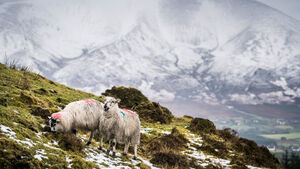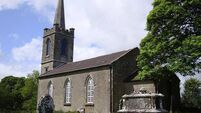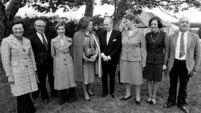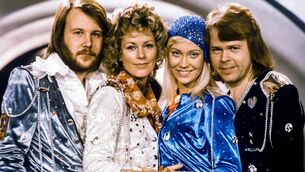John Healy: "The Christmas we share"

Sheep in a snow-covered field near Bofeenaun, with Nephin Mountain in the background. Picture: Keith Heneghan
And so we reach another Christmas Eve and another Christmas: go mbéirimís beo… This weekend I went home to Charlestown, for Christmas is not Christmas until you go home. All the fairy lights of Dublin, all the brash commercialism, all the rush of Christmas, the frantic spending, the jammed shops, the gift wrappers and tinsel, the go-go-go, they’re grand in a television sort of glamorous way, but they’re not really Christmas.
We all, I suppose, have our own ideal Christmas, and it never really changes. The weather was always diamond bright and hard, a brilliant cold sun, a slow dusk when you said, “There’ll be a bit of frost tonight”, and you could see in the sky the Evening Star as bright as a lighthouse.
It was so this weekend and coming home on Sunday night the sky was full of stars, more full than ever a Dublin sky is.
It was nice to see my two youngsters notice it, too.
“Look,” they said, “there are more stars here than we ever saw before.”
This is true to a Dublin child for whether it is the haze that hangs over a great city, or whatever, you will never see a skyful of such wonderful stars as you do in the West.
And on Monday morning you woke and heard the robin, tiny on the bare sycamore branches out from the back door of the house, brilliantly red-breasted against the hard blue brilliant sky, his voice filling the quiet of the backyard and the field and the morning behind him.
“The robin is still here,” you say, and you are thankful. He has changed his perch. Years ago it used to be on top of The Big Evergreen.
In the first sharp bright days of December, his voice would be heard and we said in our house that the letters from America were on the way.
Never mind that when you grew older you learned that a robin was staking out, with his song, his claim to that piece of territory. And when he hopped down in the yard to pick the crumbs of bread, you knew the American letters were almost here.
Years ago, coming from school, I brought home a tiny sycamore that had just two leaves from behind the Chapel and planted it ‘for a lark’. Today, it is a respectable size and Our Robin has transferred to it.
This year he sang as loud and as true as ever, and though the year had seen passings in America – passing that diminished – the legend of the Robin was not diminished. Our American letter arrived as the singing Robin said it would….
This week, I imagine, the robin sang in many a Mayo home. I watched the postmen go their rounds and so full were the bags that many of them had to abandon their bicycles to deliver the American and British gift parcels by car. And from half a world away came the greeting cards and the letters from friends of the past.
Many of them are the once-a-year letters, full of news and evidence of the passing years.
“Imagine, Bertie is getting married – God send him luck”, or “Marty got his degree in engineering – he was only a nipper when he left”.
“Jimmy has two young daughters – where do the years go?”
And you remember when Jim was only a lad going to school and the day Bertie and yourself bagged the river and got 15 trout and two pike – and a chase when Joe, coming from the cows, waved an ash plant and threatened to leave it across our back “if I catch ye”.
It is a remembering time for those at home and those who are away. It does not matter how far away they are in terms of miles or time; they are remembered as they were when they were here. We do not let time age them or their new environment change them. Thus, when we hear Bertie is getting married, it is a surprise for Bertie to us is still that small devil-may-care lad who bagged a river or ran a message with the same facility and happy smile.
The imagination tries to picture him as a serious young man about to come into a man’s estate, but the smiling eyes and the little bob of hair he had dances before your mind and you cannot quite picture him accurately but you know the woman who gets him will have a good man who won’t carry the troubles of the world with him.
Coming down on Saturday, the bulging cars full of men and women and suitcases and fancy parcels sped by us: the men of the West and the women of the West were coming home for Christmas to Belmullet, Ballycroy, Achill, Louisburgh, Ballyhaunis, Kilmovee; to Roscommon and Galway.
They were coming in comfort by car that would leave them at their door and leave money in the pocket of the local hackney driver. Their coming made the old people happy and between now and New Year’s Day, there’ll be an odd tentative remark: “Maybe next year you’d stay.”
“Sure next year you’ll be in Kilburn with us – aren’t you coming over in September, the two of ye?”
There is a smile, a sod is replaced on the blazing hearth and there is a joke: “Sure what would we be doing beyond in Kilburn?”
And the old know that the young will, no more than them, never change their way…
No matter, it’s Christmas and we won’t talk about that now.
The countryside is looking well. The lads are home and the ‘crack’ is good and the chapel on Christmas morning will be full. What it lacks in furs and new Christmas outfits, it will make up in other interests.
“Didn’t Mick’s lad turn out to be a fine man – he has the mother’s fair skin.”
“Who’s the tall good-lucking girl in front of him?”
“That’s Kate Dan’s daughter – wouldn’t you know her anywhere – she’s the cut down of her grandmother.”
“Well, is that who she is? When did she come?”
“She arrived up the night before last – and £50 with her for the old people.”
“Well, all of Kate Dan’s were the good rearing – God bless them.”
“Yes, and her youngest fellow arrived in the same night and put another £50 to it. And Jim that’s beyond in Bolton with a family sent her a letter too – and it was no light one either.”
Bolton or The Bronx, Newcastle or New York, Chicago, Detroit, San Francisco or Miami, they have remembered us at home. The year, no doubt, brought them their own sorrows and setbacks, their own losses and troubles, but at Christmas they always remember.
It has always been so with our people and we who stay at home remember them with gratitude and can only hope that their Christmas will be as joyful as their remembrances make ours.
There is much we would like to share with them.
The cackle of geese in the cold evening, the waddle of fat ducks coming home from the pond, the clip-clop of horse-hoof flint-hard on the road home from the Big Market, ‘the Christmas’ in the back of the car in a bed of clean hay, the smell of scalding hot water on a big plump turkey, the plucking in which everyone gives a hand, the jug of punch with cloves in it, the extraordinary clear night sky when any minute it seems the Star of Bethlehem might again move across the sky… the smell of wax in the Parish Church on Christmas morning, the cold, the choir, with the usual preaching voice or two, from ‘the seniors’ class in the school, singing the 'Adeste', the smell of turf burning bright and busy, smoke rising into the sky… blazing fires and the kettles singing when you arrive home ‘famished’ from early Mass, the turkey beginning to sizzle in the big oven – and that great contented sleep by the hearth after the Christmas dinner.
It hasn’t changed…
And so if you are in Chicago or Miami, Bolton or Brooklyn, New York or New Zealand, you will know that we remember you, too. We thank you for your letters and your gifts and will remember you on Christmas Day and on Wren Boy’s Day and wish you the old wish of Health, Wealth and Happiness, with all of God’s blessings on what you do and on your family.




